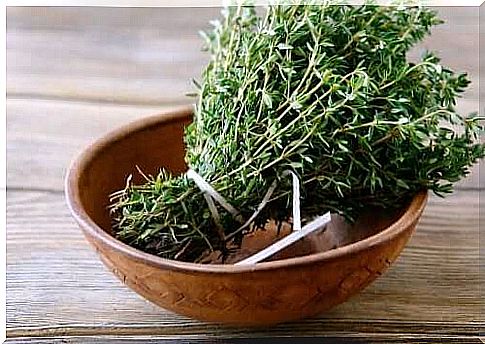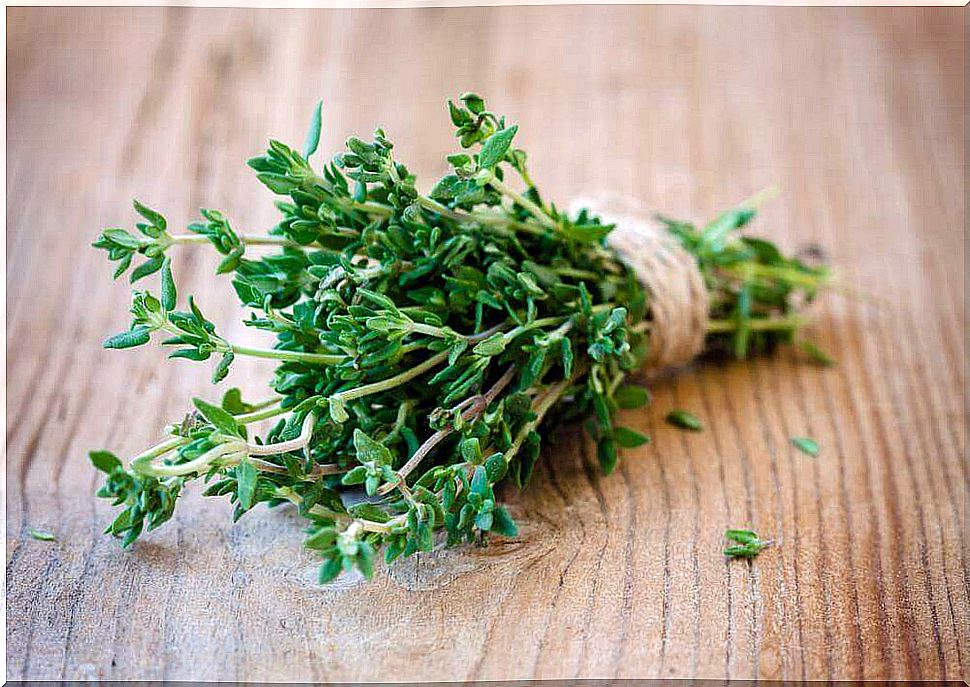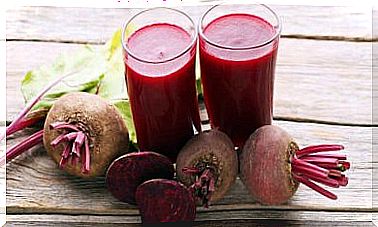Properties Of Thymus And Its Health Benefits

For hundreds of years, the interesting properties of thyme have been exploited for human health, and it is no coincidence that it is one of the best known medicinal plants. Its nutrients contribute to the prevention and treatment of some diseases. Moreover, thanks to its aroma, it is one of the protagonists of Mediterranean cuisine. Do you know the benefits and properties of thyme?
Although this plant is often used in cooking, few know that it can also be an excellent ally for the body. Among its main components, essential oils, phenols and also flavonoids stand out, known for their antioxidant properties. It is also a source of vitamins and minerals. Let’s see its main areas of application.
Properties of thyme: nutritional contribution

Thyme is a herb belonging to the mint family. It is estimated that there are over 400 subspecies of it. Thanks to its characteristic flavor, it is one of the most used plants in the kitchen. But thanks to its properties, it is also famous in traditional medicine. Among its components stand out:
Flavonoids and phenolic acids
You should know that thyme is rich in flavonoids and phenolic acids. These antioxidants limit the damage caused in the body by free radicals. Their antioxidant power also reduces the risk of contracting cardiovascular disease.
Iron
Thyme is an excellent source of iron for health. Keep in mind that iron contributes to the transport of oxygen and the formation of red blood cells. It therefore contributes to the birth of new cells, hormones and neurotransmitters.
Vitamin K
Thyme contains high levels of vitamin K, which is essential for making proteins that help the blood to clot.
Magnesium
Many of the benefits of thyme are due to its magnesium content. This mineral helps to regulate the heartbeat, ensures the proper functioning of muscles and the transmission of nerve impulses.
C vitamin
Finally, this plant is a good source of vitamin C. For this reason it plays an important role in maintaining the structure of tissues, bones, cartilage, teeth and gums.
5 properties of thyme for health
Thanks to its interesting content of essential nutrients, it is not surprising that thyme brings so many health benefits. Many of its extracts are used to make supplements and as an integral part of alternative remedies.
1. Strengthens the immune system

Thanks to its antioxidant content, including vitamin C, thyme is a great ally for improving the functions of the immune system. In addition, it releases antimicrobial and antiseptic effects that help fight different viruses and bacteria.
Some research reports evidence to support the efficacy of this plant against respiratory tract infections and against coughs. It is used, in particular, in herbal infusions to help fight colds and to gargle that help soothe oral cavity and sore throats.
2. It is an antioxidant
Many of the benefits of thyme are due to its antioxidant power. This plant stimulates the organism as a whole, from the digestive system to the muscles, passing through the immune system.
At the same time, it fights the damage caused by free radicals, reactive molecules involved in the appearance of certain neoplasms and diseases associated with aging.
3. Properties of thyme: it is good for digestion

Thyme is a plant that stimulates the appetite and provides relief from the discomfort associated with gastrointestinal disorders. The phenols contained in this plant give it an antispastic action and can act on slow digestion, swelling and belching, as well as calming stomach cramps.
Its antifungal and antimicrobial properties also help keep elements that could damage the intestinal flora under control. As for urinary tract infections, thyme infusion helps fight cystitis, urethritis and prostatitis.
4. Properties of thyme: source of essential minerals
The health benefits of thyme are immense. The thymus consists of a good dose of iron, which is essential for the transport of oxygen and for the formation of red blood cells in the blood. In addition, it provides vitamin K, which is necessary for the production of proteins essential for the blood clotting process.
Thyme is a source of manganese, which acts as a cofactor of several enzymes capable of simplifying a dozen metabolic processes of different nature, and of calcium, which contributes to the proper formation of bones and teeth, as well as to preserve nature.
5. A beauty ally

Finally, thanks to its antiseptic and healing properties, thyme is used to counteract skin disorders in case of fungal infections, wounds, herpes and in a wide range of skin diseases. Moreover, it soothes skin redness, gives relief from sunburn and small wounds.
Thyme tea is also useful for oral and dental hygiene, as it heals and keeps teeth and gums healthy, as well as counteracting bad breath and cavities.
And you, did you know these benefits of thyme? Thanks to its aroma and virtues, it is worth including it in your daily diet. However, if you are taking any medications or suffer from a particular condition, consult your doctor before consuming it. In some specific cases it could interact with drugs or be counterproductive.









